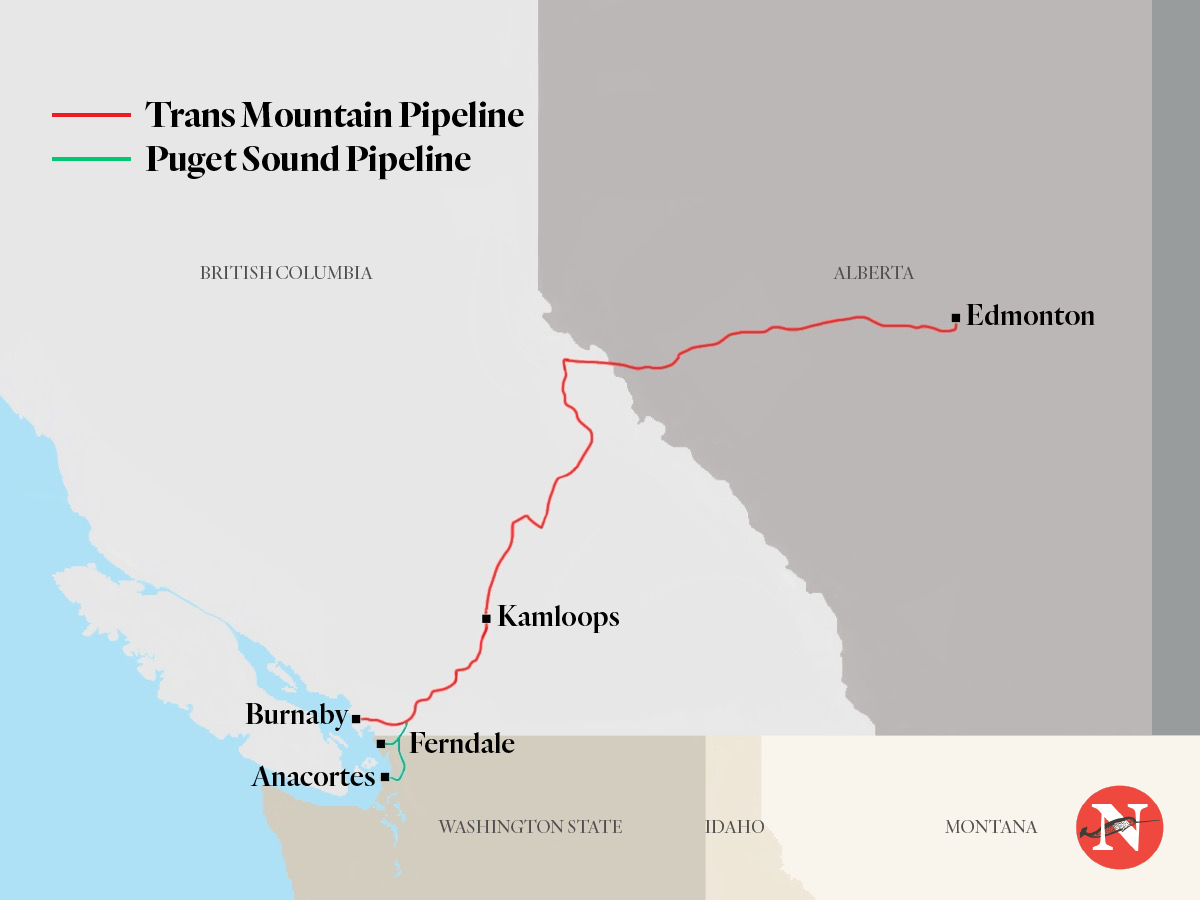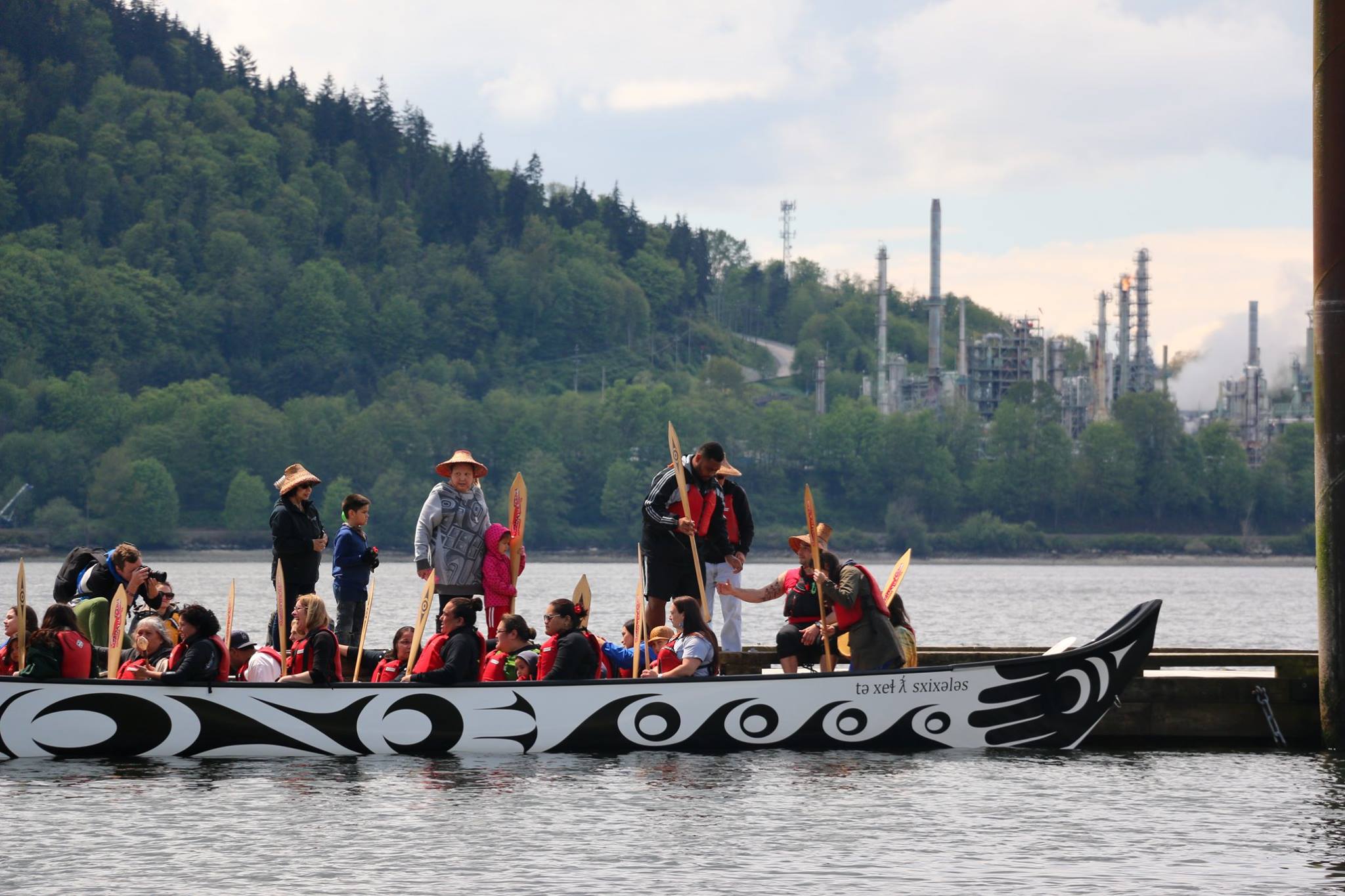
‘Afraid of the water’? Life in a city that dumps billions of litres of raw sewage into lakes and rivers
10 billion litres of sewage are dumped into Winnipeg’s lakes and rivers each year. Some...
launched to protect critically endangered southern resident killer whales from increased tanker traffic has reached the end of the line, but opponents of the Trans Mountain pipeline expansion say the years-long effort to stop the project is far from over.
On Thursday, the Supreme Court of Canada refused to hear the legal challenge launched by Ecojustice, on behalf of its clients Raincoast Conservation Foundation and Living Oceans Society, which argued the decision to re-approve the Trans Mountain expansion violated Canada’s Species at Risk Act.
The Supreme Court also refused to hear a case from Tsleil-Waututh First Nation challenging a Federal Court of Appeal decision to limit the scope of a judicial review hearing into the pipeline approval.
Despite these legal losses, opponents of the project say another legal challenge, mass protests, civil disobedience, and efforts through the ongoing regulatory process to force the Crown Corporation to re-route certain segments of the pipeline could cause further costly delays to the project, which is now expected to cost $12.6 billion.
“Most of that money has yet to be spent so there’s still a chance for the federal government to put that money to better use,” said Sven Biggs, a climate and energy campaigner with the environmental organization Stand.earth.
The Trans Mountain pipeline expansion involves the construction of a second 1,150-kilometre pipeline from Strathcona County, outside of Edmonton, to Burnaby, B.C. The project is expected to nearly triple the flow of diluted bitumen and other petroleum products to the coast and result in a sevenfold increase in tanker traffic through Burrard Inlet to the Westridge Marine Terminal.
Opponents of the pipeline, which has been a major source of political turmoil, have repeatedly raised concerns about the project’s environmental impacts — from an associated increase in greenhouse gas emissions to the risks of a diluted bitumen spill on the coast.
Environment and Climate Change Canada estimates the upstream emissions from the additional oil produced and processed by Trans Mountain would release 13 to 15 million tonnes of carbon dioxide every year. The climate impacts of the expansion were not considered by the National Energy Board in its review of the project.
Supporters, meanwhile, highlight job creation and the need for additional pipeline capacity to bolster Alberta’s oil industry. There are more than 2,900 people working on the project currently and more jobs are expected in the coming months, according to Trans Mountain Corporation.

The route of the Trans Mountain pipeline. Portions of the pipeline expansion are already under construction in B.C. and Alberta, however 32 per cent of the route still needs approval from the Canada Energy Regulator. Map: Carol Linnitt / The Narwhal
During the initial review stage of the Trans Mountain expansion the National Energy Board excluded the marine shipping element from consideration of the project’s environmental impacts.
That exclusion, alongside the federal government’s failure to adequately consult First Nations, ultimately led Canada’s Federal Appeals Court to rule the project review was flawed.
The project was re-approved following a reconsideration process, a decision that could have serious consequences for an endangered population of whales that frequent the Salish Sea.
Misty MacDuffee, a conservation biologist with Raincoast Conservation Foundation, said the project increases the risk of extinction for the southern resident killer whales. The pipeline’s expansion would increase the number of tankers in the Burrard Inlet and Salish Sea from five to 34 each month.
As of July 1, 2019, the population of southern resident killer whales had dropped to 73, the lowest it’s been since the 1970s, according to the Centre for Whale Research. A whale named L41, missing since the summer, could bring that total number down to 72 individuals.
Added noise from the increase in tanker traffic to the Westridge Marine Terminal could make it more difficult for the whales to communicate and affect their ability to forage for food, MacDuffee explained.
The federal government has taken steps to reduce the pressures on these whales, including measures to reduce noise by reducing the speed of marine vessels. But MacDuffee said she’s concerned the noise levels from added tanker traffic could still be too high for the southern residents, even if they’re travelling at lower speeds.
It’s “tremendously disappointing,” said Margot Venton, one of the Ecojustice lawyers on the case, of the Supreme Court’s decision.
“I was disappointed and then, of course, quite frustrated that the important question of whether Canada complied with the requirements of the … Species At Risk Act in the reconsideration process is actually just never going to be answered,” she said.
“Obviously, this isn’t an issue that we or anybody else is going to abandon,” Venton said. “Now, we have to shift our focus to ensuring that the government complies with the Species At Risk Act as the project goes forward.”
The court’s decision, meanwhile, was welcomed by both the Trans Mountain Corporation and the federal government, which purchased the existing pipeline and expansion project in 2018.
“The [Trans Mountain] project will create good jobs for Canadians, help us gain access to new markets for our resources, and support our transition to a cleaner future, generating revenue to help fund clean energy and climate change solutions,” Ian Cameron, a spokesperson for Natural Resources Minister Seamus O’Regan, said in a statement.
The Supreme Court of Canada’s Thursday decision also denies the Tsleil-Waututh Nation the ability to appeal a previous decision that limited the nation’s say on impacts to killer whales as well as how the pipeline’s expansion affects Aboriginal rights and title.
That previous ruling meant the Tsleil-Waututh could not make arguments related to the impacts of marine shipping, compliance with the Species At Risk Act, or the federal government’s failure to consider Tsleil-Waututh Nation’s “Aboriginal title and rights by refusing to justify infringement of rights or obtaining consent,” according to a statement from the nation.
Now, Tsleil-Waututh Nation is launching a new appeal, challenging the Coldwater decision, which found consultation with First Nations to be adequate in the pipeline expansion’s approval.
“We took this issue to the Supreme Court of Canada not only to stand up for our inherent and constitutionally protected rights, but also to make sure that Canada follows their own laws when making decisions,” said Tsleil-Waututh Chief Leah Sisi-ya-ama George-Wilson in a statement. “We are disappointed in this result, but our opposition remains unchanged.”
“This isn’t over by a long shot,” she said.

Participants gathering in canoes during a Tsleil-Waututh Nation water ceremony in 2017. The Westridge refinery can be seen in the background. Photo: Zack Embree / Tsleil-Waututh Nation Sacred Trust
“That’s the big one,” said Kathryn Harrison, a political science professor at the University of British Columbia, of the Tsleil-Waututh’s new legal challenge.
“What I’m waiting to see is what happens after that. That would be the moment where I think things could shift potentially more towards the kinds of blockades and civil disobedience that we have seen in the past on Burnaby Mountain … and that we have been seeing with the [Coastal GasLink] pipeline.”
In the past, thousands of people have made their way to Burnaby Mountain to protest the project and more than 200 have been arrested for blocking access to Trans Mountain sites in violation of a court injunction.
Biggs, the climate campaigner with Stand.earth, said he thinks “it’s very likely that there will be protests and renewed civil disobedience when construction starts in earnest in the spring.”
Trans Mountain plans to have the new pipeline in service by 2022 and project construction is already underway in some areas of B.C. and Alberta.
On Thursday, dump trucks were moving in and out of Trans Mountain’s Burnaby Terminal, where the drone of construction work from inside the chain-link fence could be heard above the pitter-patter of the rain. The number of tanks used to store crude oil and refined petroleum products at the Burnaby Terminal will double to 26 with the pipeline expansion.
Just a few kilometres away, work is also underway at the Westridge Marine Terminal on Burrard Inlet, where three new shipping berths will be constructed to accommodate additional tanker traffic.
While construction of the pipeline itself has begun in the Edmonton area, 32 per cent of the route still needs approval from the Canada Energy Regulator.
Thirty different detailed route hearings will take place this spring and summer during which the regulator will consider objections to portions of the pipeline route from Burnaby to just north of Kamloops, B.C.
“There are a number of spots that are super controversial,” said Biggs. And, if Trans Mountain is ordered to find a new route for some segments, it could further delay construction and drive up the costs, he said.
“Costs are mostly driven by delays.”
In a statement, a spokesperson for Trans Mountain said the corporation has included a $500 million contingency in its cost estimate to cover the costs of delays caused by protests, weather, or other factors.
Get the inside scoop on The Narwhal’s environment and climate reporting by signing up for our free newsletter. On a warm September evening nearly 15...
Continue reading
10 billion litres of sewage are dumped into Winnipeg’s lakes and rivers each year. Some...

Court sides with Xatśūll First Nation, temporarily halting Mount Polley mine waste expansion

Break out the champagne: Emma’s storied life and leadership in journalism has earned her the...
